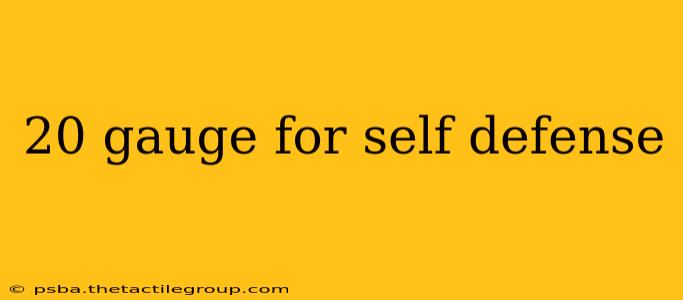Choosing a firearm for self-defense is a serious decision requiring careful consideration of various factors. The 20-gauge shotgun is often overlooked in this discussion, but it deserves a closer look. This guide will delve into the pros and cons of using a 20-gauge shotgun for self-defense, helping you determine if it's the right choice for you.
Advantages of a 20 Gauge for Self-Defense
The 20-gauge offers several compelling advantages over larger gauges like 12-gauge, especially for those who might find a 12-gauge too powerful or cumbersome.
1. Lighter Recoil: A Key Advantage for Many
One of the most significant benefits of the 20-gauge is its noticeably lighter recoil. This is crucial for self-defense, where rapid follow-up shots are essential. Lighter recoil allows for faster target reacquisition and improved accuracy under stress. This is particularly beneficial for smaller-statured individuals or those new to firearms.
2. Easier to Handle and Maneuver
The reduced weight and smaller size of a 20-gauge shotgun make it easier to handle and maneuver in tight spaces. This is a significant advantage in a home-defense scenario where close-quarters combat is more likely. Its lighter weight also reduces fatigue during extended use.
3. Less Intimidating (Potentially)
While the stopping power is substantial, some may find the 20-gauge less intimidating than a 12-gauge, particularly for those unfamiliar with firearms. This can be advantageous if the goal is to deter an attacker without excessive force.
4. More Ammunition Capacity (Potentially)
Depending on the model, some 20-gauge shotguns can hold more rounds than comparable 12-gauge shotguns, providing a potential advantage in extended self-defense situations.
Disadvantages of a 20 Gauge for Self-Defense
While offering significant advantages, the 20-gauge also presents some drawbacks.
1. Less Stopping Power than a 12 Gauge
This is arguably the most significant drawback. A 12-gauge shotgun generally delivers more stopping power, meaning it’s more likely to incapacitate an attacker quickly. While a 20-gauge is still effective, the reduced shot size and velocity mean there's a slightly higher chance of a less-than-immediate effect.
2. Limited Ammunition Availability
While readily available, 20-gauge ammunition may not be as widely stocked as 12-gauge, potentially making it harder to find in emergencies.
3. Higher Cost Per Round (Sometimes)
In some cases, 20-gauge ammunition can be slightly more expensive per round than 12-gauge, although this isn't always the case.
Choosing the Right Ammunition
Selecting appropriate ammunition is paramount. For self-defense, consider using buckshot or birdshot depending on your specific needs and circumstances. Buckshot offers greater stopping power but a smaller effective range, while birdshot offers a wider pattern but less stopping power. The choice depends on the potential engagement distance and the level of threat.
Conclusion: Is a 20 Gauge Right for You?
The 20-gauge shotgun can be a viable option for self-defense, especially for individuals who prioritize lighter recoil and easier handling. However, it's crucial to weigh its advantages and disadvantages against your specific needs and capabilities. The reduced stopping power compared to a 12-gauge is a significant factor to consider. Ultimately, the best self-defense firearm is the one you can handle effectively and reliably under stress. Consult with firearms experts and undergo proper training before making a decision. Always remember that responsible firearm ownership and proper training are essential for safe and effective self-defense.

